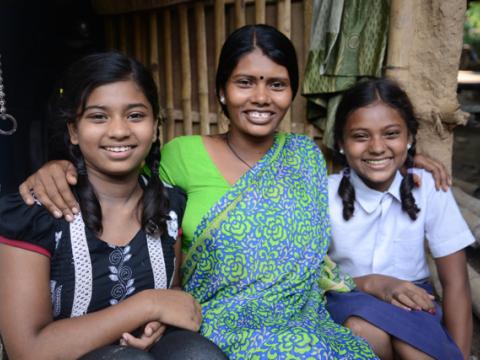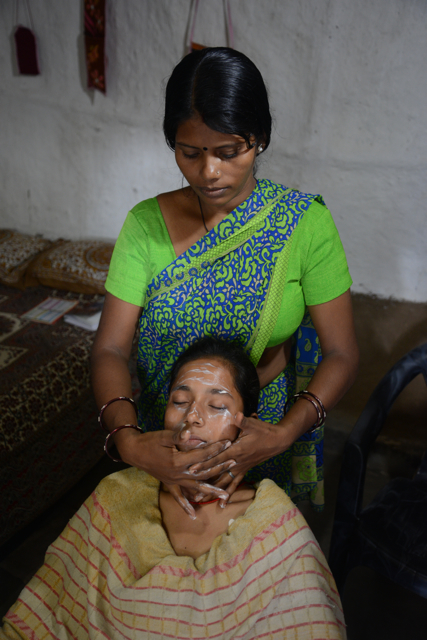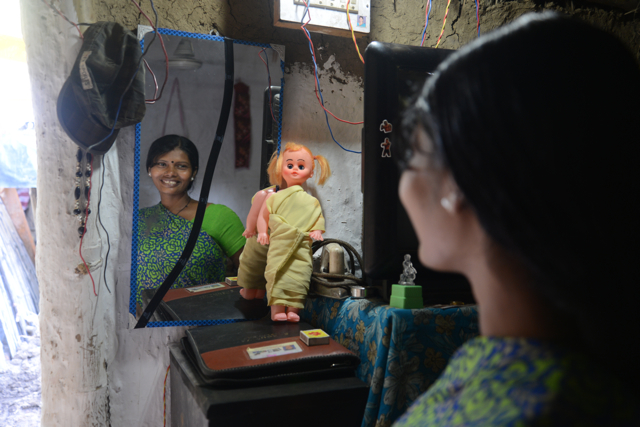Beauty and the Beastly

Loved and cherished by her father, Nilam couldn’t ask for more. Trotting off to school everyday, she dreamed of becoming a police officer in the Bihar Forces, like her father.
"My father sent us to private school. He never discriminated between boys and girls in the house because he is an educated man,” she remembers fondly.
Despite her father’s second marriage, Nilam’s family of 10 lived in harmony. Money was not in abundance, but it satisfied every desire little Nilam had.
When her father was transferred to another state, Nilam could do nothing but helplessly watch him depart. He left the reigns of the household to Nilam’s mother.
"My mother had a conservative and traditional way of thinking. She used to always tell me 'what would girls do by getting educated?’ She was not educated herself and did not realise the importance of studying,” Nilam says. “Studies are very important because your mind becomes wise. When we have wisdom then we can counter ignorance.”
But ignorance sealed Nilam’s fate to sacrificial servitude and bondage. Swayed by the sweet talk of Nilam’s future in-laws, her mother committed Nilam’s life into their hands.
Reliving that regretful day, Nilam says, "My in-laws came to my mother saying that we will treat your daughter right and take good care of her. Never once did my mother ask me what I wanted. Without my father’s knowledge she got me married. I was only 15."
"I was still at my mother’s house after marriage and she promised not to send me away before 18. But she pulled me out from school in Grade 9 because my husband didn’t want me to study. He used to say 'What’s the point of educating her. I am not educated, so why should she be?' So my mother wanted to respect his wishes," she says.
Despite her challenges, Nilam woke up every morning, accepting her fate. Taking pleasure in simple things, Nilam adorned herself each day with small trinkets, the one thing she could call her own. But that contentment was short lived.
"It started with my earrings. He said by selling them he would get money to buy things for his house. But in reality it was for buying alcohol. When my mother stopped me from giving them to him, he dragged me out of my home and took me to his place."
Ironically, she was welcomed by a flurry of slaps and punches into a dilapidated shack, what she now had to call home.
"Domestic violence against women is a common problem found all across India and it is more abusive when the husband is an alcoholic," says Sarlin, a programme development information coordinator.
Nilam prayed for the violence to stop and despite the arrival of four children, those prayers were far from being answered.
With no contribution from her husband, Nilam was left to provide for her children. She was thrown into the abyss of casual labour in order to keep her children from starving; a new low point she never imagined for her life.
"I picked up whatever work I could find. Labour work at construction sites fetched me little money. I had to manage the household with that money," she says while taking a deep breath and fighting back the tears. "He didn’t let me use the money, I earned. When I got back from work he asked me for money to appease his thirst for alcohol. If I didn’t give it or used it to get food for the children, I was beaten."
Choking over her tears she says, "I could not provide nutritious food for my children. Even when I enrolled my children in school, he went and fought with the teachers and pulled them out of school."
In 2007, a spat over the spending money for buying milk for the children, escalated to brutal assault and she was rushed unconscious to the hospital.
With regret echoing through her voice Nilam says, "When I was still critical in the hospital. He used to come for money, but he spent it all on alcohol. My children were hungry and neighbours fed them leftovers. Ignoring all the pain, I went back home to him. In my heart I thought he would change. I did everything at home, everything. At that time I was not empowered and accepted my fate the way others dictated. But when his actions put my children’s future at risk, I decided to leave."
On the streets and homeless, Nilam and her children sought refuge in an open courtyard. Acquiring a job as a domestic maid for a doctor, she tried her best to provide for her children. With only a pittance of earnings, she faithfully invested in the children’s education and in a temporary shack she called home. But her body, weak from years of physical abuse, resisted this endeavour. Fainting at the work, frequently and being hospitalised cost Nilam her job.
With a deep breath she says, "That time was the toughest for me. I had lost my job. I started falling sick often. Due to my helplessness, I had fallen from going to private school to becoming a casual labourer and a maid. I had lost my dignity and no one respected me in the community."
"But things changed when my path crossed ways with World Vision, [they] gave me a means to survive."
"We suggested a solution for generating income, under our programme, the youth resource livelihood academy. Women and older girls were enrolled for a six-month tailoring course or beautician’s course. Beneficiaries, part of this programme, are between the age groups 15-35. Without any investment, for the course enrolment from the beneficiaries' side, they get jobs according to the skills acquired. Nilam is one such beneficiary," says Bin Chako, a programme manager of World Vision India.
As Nilam entered the classroom, she wondered whether a high school dropout could learn such techniques and processes.
While arranging the beauty products on a wooden counter at home, Nilam with a slight grin says, "I had never gotten my eyebrow done. Never had I stepped into a parlour, in fact never seen one. How was I to learn all this? I doubted myself. Then my teacher encouraged me saying that no one learns the skill from their mother’s stomach, they acquire it. If you learn you will understand."
From threading to manicures and pedicures, from styling hair to facials, Nilam picked up the art of beautifying others. Her faith and confidence in the skill acquired grew leaps and bounds. As word of the maiden Nilam, possessing this paramount power to beautify, spread around, people couldn’t wait any longer for Nilam to work her magic on them.
"Once they came to know that I am doing the beautician's course through World Vision, people were ready to pay for the procedures and techniques I was learning," says Nilam.
Grateful to World Vision for her holistic restoration Nilam says, "Now I walk with respect and my head held high. I am known as the beautician. My dignity and respect in society has been restored through this profession."

